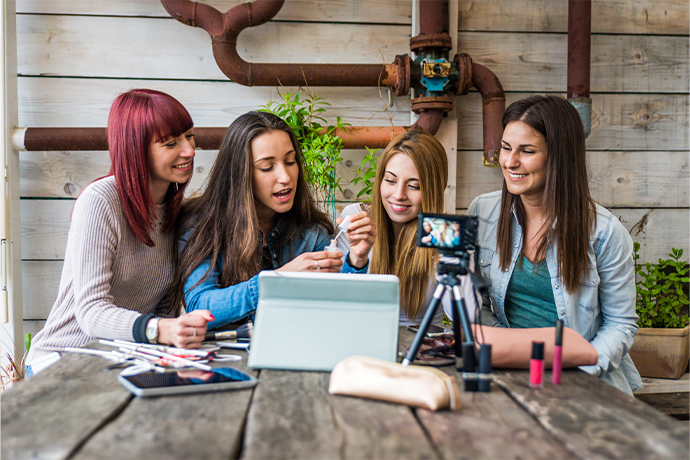 SPEAKERS
SPEAKERS
Explore ten essential insights on B2B influencer marketing, a powerful strategy for businesses seeking to differentiate themselves and engage with their target audience effectively.

The business environment is so competitive that firms are always looking for unique ways to set themselves apart and reach their targeted audience effectively nowadays. In this case, B2B influencer marketing becomes a potent enabler of making genuine connections and delivering outstanding results. Distinct from conventional marketing methods, B2B influencer marketing uses the reliability and expertise of industry leaders to connect with professional audiences.
We gathered ten key insights companies need to know about B2B influencer marketing to harness its potential effectively.
B2B influencer marketing is becoming a leading approach as corporations see its ability to engage professional markets. In contrast to consumer-oriented influencer marketing, B2B influencer marketing involves using industry experts and opinion leaders to help build credibility and resonance within professional communities. This approach enables a business to build respect and influence, increase interactions, and develop long-lasting relationships with both clients and stakeholders.
For B2B brands trying to navigate the competitive environment, influencer marketing is the best method. This gives them the chance to separate themselves from the rest and gain brand awareness, resulting in business growth.
Trust and authority are key in the context of B2B influence marketing. By teaming up with influencers with domain knowledge and credibility, organizations could enhance their image and take the position of authority within their sector. Such a trust-building dimension is crucial in producing long-term relations with clients and stakeholders as it gives an honest touch to the brand's communication and raises its value. By strategic alignment with reputable influencers, B2B brands can consolidate themselves as market leaders, thus creating engagement and loyalty among their target audience.

The cost of influencer marketing is a key factor that needs consideration. The importance of cost dynamics of influencer marketing for B2B lies in budget optimization and ROI maximization development. Different from traditional media channels, influencer marketing has various cost structures, from micro-influencers to macro-influencers. Although macro-influencers may charge more fees, micro-influencers often provide higher engagement and authenticity, thus bringing a cost-efficient solution to a lot of B2B companies.
Through a thorough evaluation of a cost-benefit ratio and by choosing appropriate influencers that are consistent with their budget and branding objectives, companies can be assured of an efficient use of resources and the successful working of their marketing campaigns.
Targeting accuracy is one of the foundations of successful B2B influencer marketing. By partnering with influencers whose followers are relevant to the company's target demographic, businesses can also make sure that their message is heard by the right audience.
The focused method allows that the engagement percentage has been surmounted while high-quality leads and conversions are produced at the same time. By targeting the most relevant audience segments, B2B brands can make their digital influencer marketing activities more efficient and powerful in terms of boosting brand awareness, trust, and overall business growth.
Content creation collaboration is an important part of successful B2B influencer marketing campaigns. Collaborating with influencers for content co-creation allows companies to leverage their knowledge and creativity, thus leading to genuine and compelling materials.
The collaborative way of working strengthens the relevance of the content to the intended audience, as it collects multiple views and ideas. In addition, co-crafted content is usually more trusted and credible by the viewers, thus giving additional power to a brand within its category. Collaborative content creation using the brand and the influencer's unique capabilities leads to engagement, brand loyalty and in the end, a profitable business.
The evaluation of B2B influencer marketing campaigns requires the measurement of impact beyond vanity metrics. Although likes and shares give a superficial understanding, looking at metrics like leads, traffic, and conversions provides a more in-depth view of the performance and ROI of a campaign.
By analyzing these critical metrics, companies can measure the effect of their influencer partnerships on business bottom-line objectives. Such a data-oriented approach allows marketers to optimize future strategies, assign resources appropriately and show the measurable value of influencer marketing in business growth and marketing goal attainment.
Establishing a lasting association with influencers is a key factor for continuous prosperity in B2B influencer marketing. By cultivating partnerships that are founded on mutual trust and respect, organizations can access a constant supply of advocacy and thought leadership within their industry ecosystem. Long-term collaborations ensure that the message remains consistent and that the brands’ core values are continually reinforced. In addition, the continued collaboration with the influencers enhances the connection between them and their audience, which increases the effect of the brand message and creates engagement. By focusing on relationship-building activities, B2B brands are able to fully realize the power of influencer partnerships in attaining sustained results.
Maintaining trust and credibility is a must for B2B influencer marketing in terms of regulatory compliance. The regulatory environment is changing, and therefore brands should focus on transparency and integrity in their influencer partnerships. This involves following regulatory requirements and disclosures that are required by regulatory authorities to minimize risks and maintain ethical standards.
By including clear disclosures and transparent practices in their influencer marketing approaches, companies will protect themselves from any legal and reputational risks. Regulatory compliance sustains the brand and supports the investment the company has made in trust.
Employee advocacy is a strong approach in B2B influencer marketing. Empowering and motivating internal advocates to disseminate brand messaging allows companies to grow their reach in a natural way and develop an advocacy culture inside. Influencer marketing heroes that usually go unnoticed are the employees who have absolute links and esteem among their professional circles.
Employees who share company content and take part in advocacy campaigns have improved brand visibility and loyalty. Using the combined effect of their workforce, B2B brands can increase their influence and achieve their marketing objectives more efficiently.
The success of B2B influencer marketing lies in embracing adaptation and evolution. The environment of influencer marketing keeps on changing as a result of technological improvements and changes in consumer behavior. The constant agility and adaptability of businesses to developing trends and technologies are the qualities that leave the competitors behind.
Through continuous improvement of their influencer marketing techniques, businesses are able to stay in line with the current trends and smoothly interact with their target audience. This proactive strategy allows companies to take advantage of new opportunities, cope with difficulties and stay in the competition in the dynamic market, providing long-term success and continuous growth.
B2B influencer marketing is a powerful opportunity for companies to create authentic connections, become thought leaders, and generate measurable business results. Adopting the principles stated above and dealing with influencer partnerships in a conscious and genuine way helps companies tap into the power of this vibrant marketing tool. In the ever-changing world of B2B marketing, influencer collaborations reign as one of the strategies companies can use to realize their marketing goals and ensure continuous growth.